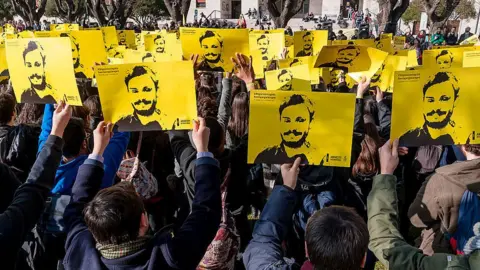Giulio Regeni: Italy accuses Egypt agents over student's murder
 Getty Images
Getty ImagesItaly has formally accused four Egyptian state security officers of the kidnap, torture and murder of Italian postgraduate student Giulio Regeni near Cairo in 2016.
Prosecutors said there was insufficient evidence against a fifth agent.
Those named will now have 20 days to respond, and any trial will probably be in absentia.
The Cambridge University student had been researching independent trade unions - a sensitive issue in Egypt.
Italian prosecutors named the four suspects - now set to be charged - as Gen Tareq Sabir, Col Ather Kamal, Maj Magdi Sharif and Col Hisham Helmy.
There was no immediate response from Egypt to the Italian allegations.
Egyptian authorities have previously denied that any of their officials were involved in Regeni's kidnap and murder. They have suggested various other explanations - including that he was the victim of a robbery by a criminal gang.
And on 1 December they said they were "temporarily closing" the investigation into the murder, with the killer "still unknown".
 Amnesty International
Amnesty InternationalRegeni went missing in Cairo in January 2016 and his mutilated and naked body was found in a ditch near Cairo nine days later.
'Unequivocal evidence'
The murder caused a diplomatic row between the two countries, with Italian prosecutors accusing Egyptian officials of trying to mislead the investigation.
"We have acquired unequivocal and significant evidence," Rome chief prosecutor Michele Prestipino told a news conference on Thursday.
"For Giulio's murder there is just going to be one trial, and it will be held in Italy."
The BBC's Rome correspondent Mark Lowen says any trial will throw a spotlight on Egypt's dire human rights record. Egypt's Commission for Rights and Freedoms says more than 2,700 people have been "forcibly disappeared" since 2015.
And it could prompt questions about a rapprochement with Italy's current government, which recently approved huge arms sales to Cairo, our correspondent says.
What happened to Giulio Regeni?
The PhD student disappeared on a research trip on 25 January 2016 - the fifth anniversary of the start of the uprising against former President Hosni Mubarak, meaning there was a heavy police presence in Cairo.
His body was discovered on 3 February in a ditch by the side of a road. His mother told the Italian parliament in 2018 that her son's body was so disfigured that she was only able to identify him by the tip of his nose.
 Getty Images
Getty ImagesAn Italian post-mortem examination found that Regeni had been tortured "in stages" between 25 January and the day of his death.
His body sustained injuries that showed he was beaten with "kicks, fists, sticks and clubs", and that he died from a broken neck, prosecutors said.
Egypt has denied that Regeni died in custody although officials have admitted that security services were monitoring him.
Egyptian investigators have previously suggested that Regeni was murdered by a five-strong criminal gang - and that all of them were then killed in a shootout. Italian officials have branded the idea "implausible".
Italian prosecutor Sergio Colaiocco told a parliamentary commission that Egyptian officials had created "fake stories... to throw off the investigation".
Other suggestions put forward by Egyptian investigators were that Regeni died in a car accident or a gay crime of passion.
